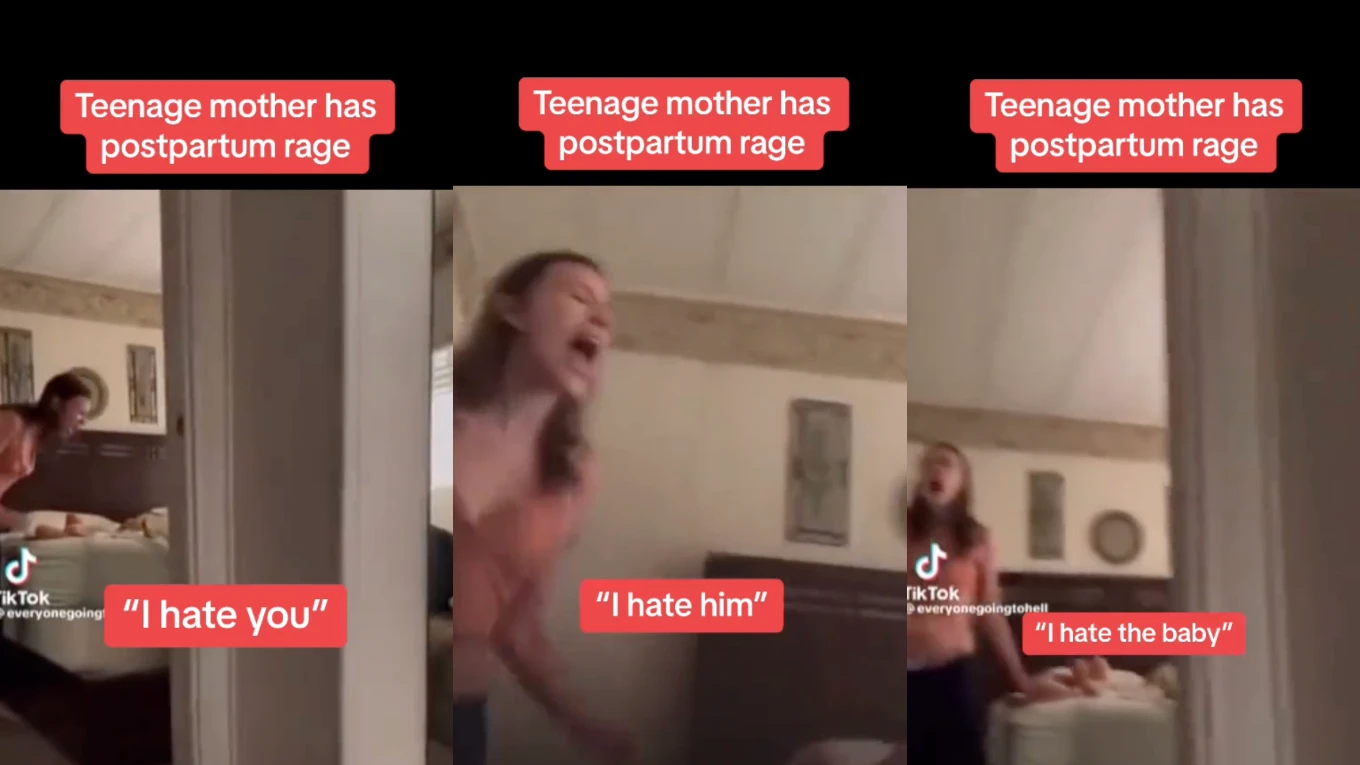Still don’t believe in postpartum depression?
Do you think moms should always be smiling, happy and calm?
The postpartum period can be extremely difficult and stressful, and the behavior of a mom who became famous on TikTok proves it.
Indeed, a dad published a video on the famous platform to show his wife’s violent outbursts towards their child.
Some Internet users were shocked and their criticism was not long in coming.
Others were more understanding and offered support and advice.
The content of the video
In six seconds, a dad shocked the Internet: he filmed his young wife (believed to be a teenage mother) shouting « I hate you » to their baby, while he tried to calm her down.
In the video, we understand that the father runs towards the baby to protect him and keep him away from his mother who has lost control.
He tells his partner that she needs to take a break and cool down a bit to control her anger.
Even though the video is particularly short, we understand that the situation is critical and that the family is suffering.
The Internet’s reaction
Of course, as you might expect, internet users, particularly women, jumped at the opportunity to criticize their parenting style.
They say the child is in danger and social services should be contacted in order to remove the baby from his parents.
What surprises me about the comments is that it is mainly women who are aggressive and judgmental towards this poor mother.
But the reality is quite different!
This young woman suffers from postpartum depression.
Fortunately, many mothers and parents recognized themselves in this video and were able to offer their informed point of view.
Among the comments, we can read:
Postpartum psychosis is real and it requires immediate treatment.
This rage is frightening and it can break both the mother and the baby.
Another user said:
No one has the right to shame this mom, many women suffer from postpartum depression and don’t dare talk about it.
In fact, they are afraid of the judgment of others!
So, shut up if you don’t know what you’re talking about…
One mother even stressed that she is delighted to see the progress in medicine and communication, because today, we know much better about postpartum depression.
We talk about it more and we can offer the necessary support and help for all mothers who are suffering.
Psychotic delusions transform a woman, so she needs love and understanding!
Postpartum depression
This mental illness is extremely serious and is one of the worst forms of depression.
In 2023, it has been reported that 16% of mothers will suffer from postpartum depression.
While it is normal to have the baby blues or to have difficulty adapting to your new life, this psychosis goes well beyond that.
The symptoms of postpartum psychosis are varied:
- Persistent sadness : for at least two weeks, the mother feels hopeless and empty
- Mood swings : She may go from being extremely sad and tearful to feeling irritable or anxious.
- Loss of interest or pleasure : She may lose interest in activities she previously enjoyed, including those related to her newborn, and have difficulty bonding with him.
- Fatigue and lack of energy : this happens even when the mother has rested.
- Changes in appetite and weight : Overeating or loss of appetite may occur.
- Sleep problems : Difficulty falling or staying asleep, even when the baby is sleeping, is a common symptom.
- Difficulty concentrating and making decisions : This depression affects cognitive functions, making it difficult to concentrate, make decisions or even memorize.
- Feelings of guilt or worthlessness : the mother feels guilty for not being a good mother or for not having value as a person.
- Ideas of self-harm or harming the baby
- Difficulty bonding with the baby : this leads to a feeling of detachment or indifference.
Social isolation is a common behavior, as she may withdraw from friends and family, feeling ashamed or unable to connect with others.
It is essential to understand that postpartum depression can be treated.
Early diagnosis and appropriate treatment, which may include therapy, support groups, medications, or a combination of these, can make a significant difference in recovery.
It is also essential to encourage emotional support from loved ones and friends during this difficult time.
Consequences of postpartum psychosis
In the video, we clearly see that this mother is exhibiting serious symptoms of postpartum depression.
She is therefore unable to care for her baby and meet his emotional and physical needs.
Even though the maternal instinct is natural, that doesn’t mean it presents itself without problems.
It is important that the mother receives the necessary care to heal her suffering and to create a healthy emotional bond with her child.
Of course, those who have sympathy and compassion for this mother are also worried.
After all, two things can be true at the same time!
In fact, his behavior is violent and the baby could be in danger, so the dad, the family and in serious cases the social services must intervene.
Furthermore, we could criticize the dad for filming his partner in such a vulnerable situation and publishing the video.
But who are we to judge?
If we can help, we will help, if we can’t, we will keep quiet.
It is obvious that the father is aware of the situation and is looking for support.
@youngm0msclub Postpartum rage/depression/psychosis needs more attention its real and its scary it can happen to anyone my heart breaks for this young mother and baby 💔 #postpartumdepresssion #ppd #postpartumrage #rage #newmom #teenagemom #teenmom ♬ original sound – MAMA 🙂
What is the role of dad in healing postpartum depression?
The father’s role in the healing process is important for the well-being of the mother and baby.
Indeed, he can offer emotional support by listening to his partner without judging her and validating her feelings.
Moreover, understanding the illness, its symptoms and its treatment options can help him show empathy towards his partner and offer her better support.
This man should encourage his partner to seek professional help, such as therapy.
In addition, he must be proactive in sharing responsibilities related to childcare and household chores.
Of course, patience and understanding are required to get out of this situation.
He should therefore help his partner connect with friends and family members who can provide additional support.
Ultimately, the safety of your baby must come first.
If they notice signs of suicidal thoughts or self-harm, professional help is imperative.
If the couple has open and honest communication, they can get through this!
But we must react as soon as the first symptoms of postpartum depression appear.
Also read: The 4 insane fears of mothers that no one talks about



Pourquoi mettre un terme à une relation peut être la meilleure chose pour vous
Il s’est avéré que le Prince charmant n’était en fait rien d’autre qu’une définition plutôt fidèle du psychopathe. Voilà ce qui t’attend si tu restes dans une relation amoureuse avec un homme toxique!